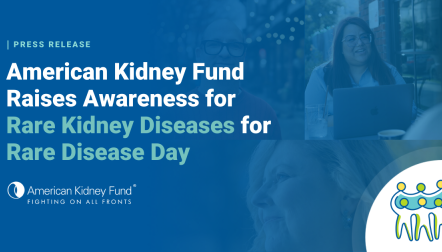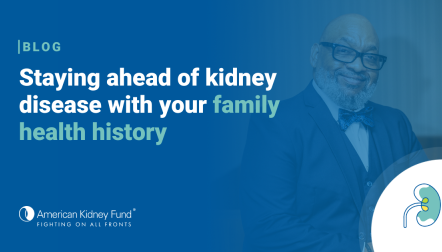
Blog post
A family affair: How kidney disease brought a family closer together

If you have a child, you may wonder what traits they will get from you and what ones they will get from their other parent. You may ask yourself, "Will they have my eyes? Will they have my nose? Will they laugh like I do?"
For Lydia Landesberg, one of the American Kidney Fund's (AKF) newest Board members, she was surprised when she learned that three of her four children inherited a genetic kidney disease from her called Alport syndrome. This was especially unexpected because Lydia did not know she had the disease until her oldest son was diagnosed.
"I had always had red blood cells in my urine and my pediatrician diagnosed it as benign familial hematuria," Lydia explained. "This diagnosis had followed me through life and suddenly I realized that it wasn't so benign, and that I had passed it on to my son. It seemed incredible. My siblings were healthy. My parents, aunts, uncles and cousins were all healthy. There was no history of kidney disease that we knew of."
Alport syndrome is a genetic disease caused by problems with three genes that control the way certain parts of your body are shaped. When there are problems with these genes, parts of your kidneys, ears and eyes do not grow correctly. Alport syndrome can cause hearing loss and eye problems, but it always causes kidney disease. Chronic kidney disease can eventually lead to kidney failure (or end-stage renal disease), which requires dialysis treatments or a kidney transplant for the person to survive.
"The variety [of Alport syndrome] that runs in my family is linked to the X chromosome, which means it affects males differently and more severely than it affects females," Lydia explained. The X chromosome is one of the two sex chromosomes passed down from parent to child. Mothers pass down an X chromosome to all of their children while fathers pass down either an X or a Y chromosome — with XX pairings creating a genetically female child and XY pairings a genetically male one.
Lydia's oldest son was diagnosed with kidney problems after a routine check-up when he was three years old revealed blood and protein in his urine. The doctor said there was a "one in a million" chance this was related to a problem in the kidneys but sent them to a nearby urologist to be safe. Unfortunately, the urologist confirmed Lydia's son was the one in a million and sent them to the hospital to get additional blood work.
"So, a routine check-up turned into a very long, scary day of medical appointments," recalled Lydia. A year later, her son did a kidney biopsy and was diagnosed with Alport syndrome. "We were devastated by the diagnosis. Initially we were told that our son would need a transplant by age 16."
Fortunately, this was not the case as it turned out he had an adult-onset variety of the disease, but her son did eventually need a kidney transplant. And as luck would have it, her one child without Alport syndrome was able to be his living kidney donor.
"A sibling has a 25% chance of being a match, so we were fortunate that my daughter was not only a match, but an almost perfect match for my son's kidney," Lydia said. She recalled that it was scary to have two children undergo major surgery at the same time. "I definitely had a moment of thinking, 'I wish it didn't have to be my daughter who is donating the kidney.' But that passed pretty quickly. For my daughter's part, she didn't have a moment of hesitation. As the only sibling not affected by the disease, she was determined to help her brother… [and] my daughter will forever be our family hero."

After surgery, Lydia's son went from being very sick to feeling better within two days. Her daughter, though, had a longer and harder recovery than anticipated. But this surgery really became a family affair as everyone pitched in to help both siblings recover.
"Our family really came together to help care for the two patients," Lydia said. "My other daughter flew to California to stay with her sister after surgery. My other son chauffeured them around while they were not able to drive. Their father and I helped with the two [preschooler-aged grandchildren] and ran a lot of errands."
Now, two years after the transplant surgery, both siblings are feeling great. In fact, brother and sister completed a triathlon this past summer in Bend, Oregon with Lydia's son taking first place in his age group!
Kidney disease has impacted Lydia's whole family, and she was surprised to discover how hard it was to find others affected by the disease when her son was first diagnosed.
"It was a strange new world for me, and I really wanted to find a support group," Lydia said. "The local hospital had support groups for cancer, addiction, heart disease and more, but nothing for families with kidney disease. The internet was in its infancy, and it was before email, so there were no online forums… I felt so alone. I really wanted to connect with people who were going through something similar."
Lydia said she wishes more people knew about kidney disease and how pervasive it is. It is part of why she joined AKF's Board of Trustees when she reconnected with an old school friend — and AKF board member. "I have been on the board of other, smaller organizations and I could see that AKF was a particularly well-run organization," said Lydia. "After joining the board, what impressed me the most is the passion of the AKF staff for the organization's mission [to fight kidney disease on all fronts]."
However, there was another reason Lydia decided to join the Board.
"What really motivated me is something that happened shortly after [my son's] transplant," Lydia explained. "I went to visit a friend in a suburban area and on my way, I saw a giant sign on a family's front lawn. It said, 'KIDNEY DONOR NEEDED!!!' I could imagine the anguish and desperation behind that sign, and I wished I could help. The AKF board has given me a vehicle through which I can work to support others as they face the challenges of kidney disease."
Her own family's struggles with kidney disease will also certainly help her in this goal. But Lydia finds herself heeding the advice of her brother-in-law, who told her not to underestimate the power of positive thinking.
"Since the transplant, I have asked myself whether we have been lucky or unlucky," Lydia said. "I still can't answer that. It certainly was an unlucky twist of fate to have this disease so prevalent in my family. But we've also been lucky in many ways; by having doctors in the family to guide us, by having my daughter qualify as a kidney donor, and by having a supportive community around us. The diagnosis also made us closer as a family, and perhaps a bit more sensitive to others. I think it's really true that all clouds have a silver lining."





